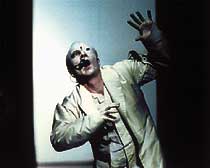"POEtry," Lou Reed and Robert
Wilson’s musical adaptation of the works of Edgar Allan Poe,
opens with a burst of music and a soundless scream – a note that,
except for the intermission, never falters until the end three
hours later.
It takes a lot of stamina to withstand all the noise and tension
only occasionally relieved by Reed and Wilson’s sly humor; this
reviewer observed one man with his fingers in his ears during
a musical interlude. In fact, several in the audience at BAM’s
Howard Gilman Opera House deserted well before the final bows.
Reed, a music legend whose perverse vision is illustrated by
songs like "Walk on the Wild Side," which New York
Times writer Andrew Essex called "perhaps the most licentious
song ever to have escaped the wrath of radio censors," has
written a libretto that mixes, or perhaps mixes up, Poe’s 19th-century
psychological horror with 20th-century existential terror. He’s
also composed 12 original songs and an overture in a variety
of styles – from hard rock to classical to Broadway camp.
For the most part the music was so loud that it completely drowned
out the lyrics. But one line in the opening song, "These
are the stories of Edgar Allan Poe, not exactly your boy next
door," left one with a titillating impression of what the
audience might be missing.
Reed has once again teamed up with avant-garde director Robert
Wilson, who staged his 1997 production "Time Rocker,"
Reed’s interpretation of H.G. Wells’ 1895 novel "The Time
Machine." And once again director and writer have entrusted
their work to the Thalia Theater, based in Hamburg, Germany.
The Hamburg connection means that although Reed wrote the libretto
in English, it has been translated into German, and only "The
Raven," the songs and occasional bits of dialogue remain
in Reed’s native tongue. The English translation of the German
translation – or perhaps the original English – is projected
as surtitles. This presents considerable difficulties for the
audience, which must constantly choose between keeping up with
the intense and difficult narrative moving quickly on the screen
or watching Wilson’s surreal tableaux.
With all the talent available in the country that nurtured Poe,
Wilson and Brooklyn-born Reed, it’s hard to imagine what persuaded
the creators of "POEtry" to have a German company produce
their work. And considering the actors’ competence in English,
obvious in their singing, reciting and bits of narrative, it’s
even harder to understand why they chose to go with a German
translation. Is German inherently more evil than English? Are
guttural exclamations any more terrifying than Poe’s melodious
lines?
Nevertheless, the 12 actors who play Poe and his crew of victims
and victimizers – from the sweet Annabel Lee to the vengeful
Montressor in "The Cask of Amontillado" – are fantastic
in every sense of the word. Dressed in Jacques Reynaud’s macabre,
sexy, elegant and even funny costumes, they dance, prance, bellow
and recite.
But in the end, they are overwhelmed by Wilson’s virtuoso staging.
He works wonderfully with light, shadow and extravagant blasts
of color. He suspends bodies without heads, heads without bodies
and eyeballs without anything. In a minimalist way Wilson creates
a mysterious world that leaves the best part to our imagination.
For anyone who has followed Reed’s career, it’s not hard to understand
what attracted the musician to the storyteller-poet. Before becoming
a contract songwriter for Pickwick Records in the early ’60s,
Reed studied poetry with Delmore Schwartz at Syracuse University.
With his group, The Velvet Underground, Reed sang songs about
the dirty underbelly of the streets – inhabited by people who
are victims of their own desires and what that leads to – addiction,
sadomasochism and promiscuity.
But if Reed finds a kindred spirit in the tortured life and works
of Poe, who died of alcohol-induced pneumonia at the age of 40,
what that translates to on the stage is something entirely different.
This something is much more akin to the absurd unreality of Kafka
or the allegorical fantasy of Herman Hesse – two writers who,
unlike Poe, did write in German – than the all-too-human petty
greed and vengeance that motivate Poe’s characters.
There’s nothing intrinsically wrong with reinterpreting Poe,
or any author for that matter. But you don’t have to be a purist
to see that Wilson and Reed have not merely missed the point.
They’ve created a work with no point.
Sure, there’s plenty of smoke and mirrors, but after a while
all that flummery falls a little flat. The English rendition
of "The Raven" and the slowly closing walls in "The
Cask of Amontillado" are high points in the production.
And an oversized body playing ventriloquist to its disembodied
head is quite amusing. But for the most part, there’s not much
left after the sound and the fury.
"POEtry" will be performed
Dec. 6 and 7 at 7:30 pm and Dec. 8 at 2 pm and 7:30 pm. Tickets
are $25, $50 and $80. The Howard Gilman Opera House is located
at 30 Lafayette Ave. For tickets call, (718)636-4100 or visit
www.bam.org.

























